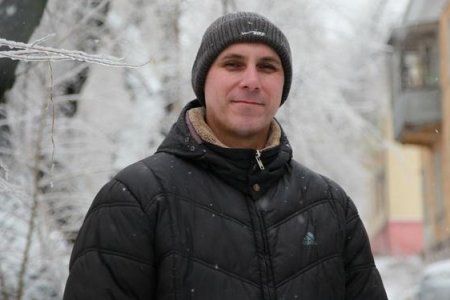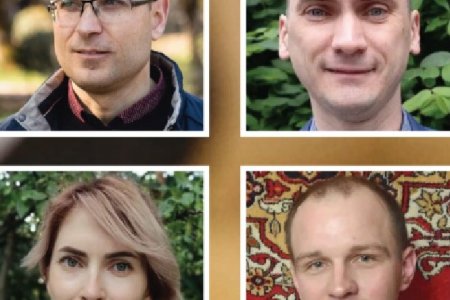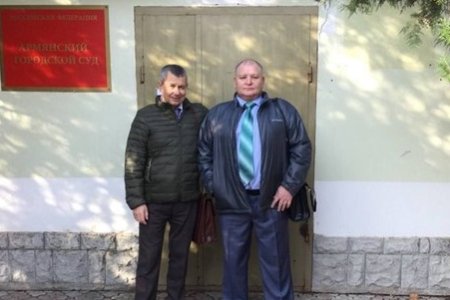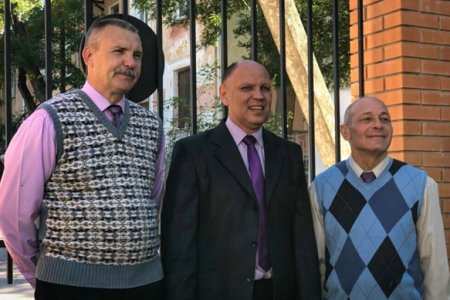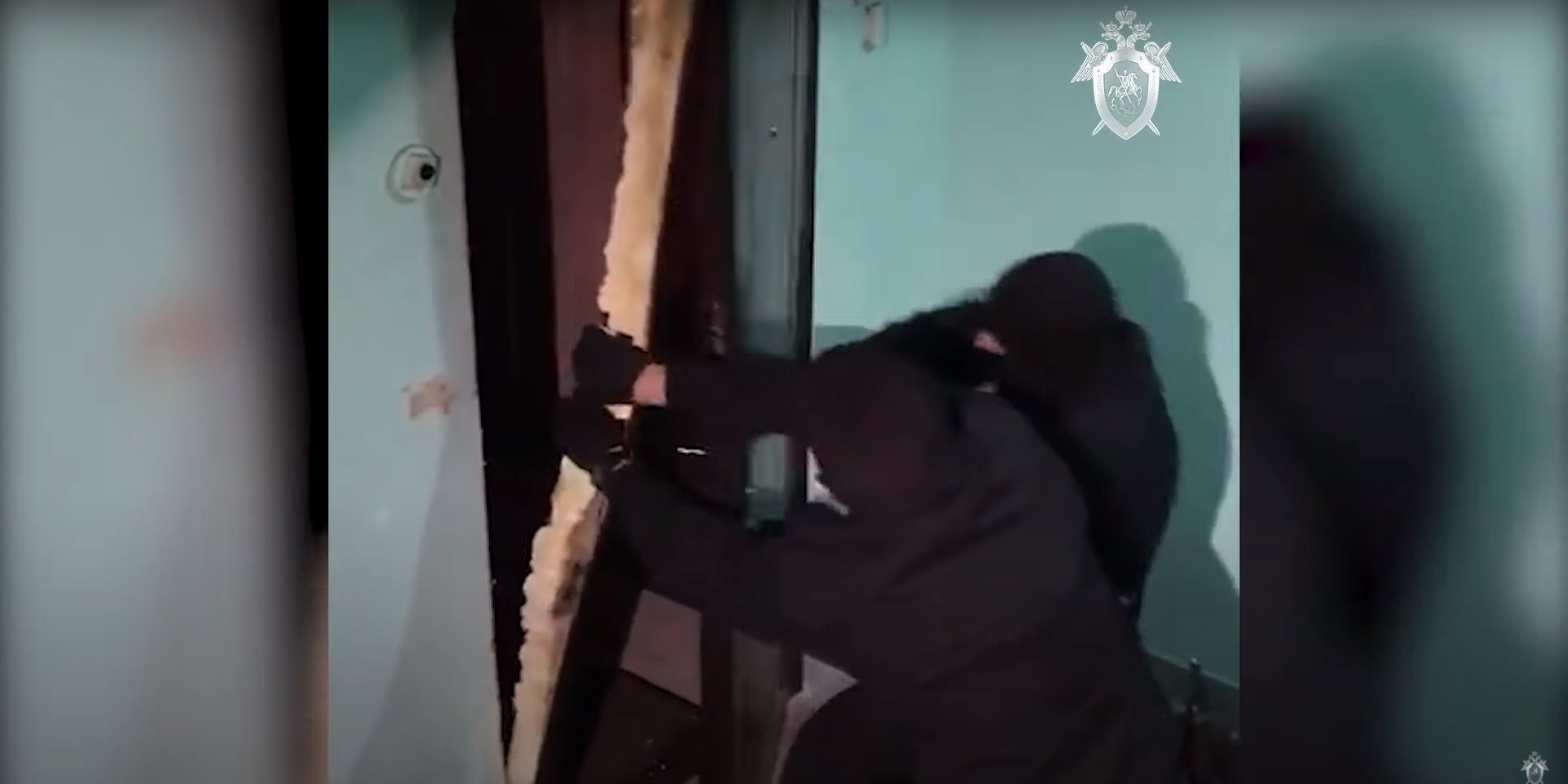
While filling prisons in occupied Crimea with Ukrainians abducted since Russia’s full-scale invasion of Ukraine, Russia is not letting up on political and religious persecution of Crimean Ukrainians. The Russian FSB carried out new armed searches of the homes of Jehovah’s Witnesses on 24 August, with two believers – 53-year-old Viktor Kudinov and Serhiy Zhygalov (51) taken into custody and facing several years’ imprisonment for their faith.
Both men are accused of ‘organizing the activities of a banned organization’ under Article 282.2 § 1 of Russia’s criminal code). They were both taken into custody, however there is no information as to whether the Russian-controlled ‘court’ in Sevastopol remanded them in custody or placed them under house arrest. A search was also carried out at the home of another couple, who had electronic devices removed before being taken away for interrogation.
It is over eight years since Russia invaded and illegally occupied Crimea and five years since the 20 April 2017 ruling when Russia’s increasingly politicized Supreme Court banned the Jehovah’s Witnesses, claiming them to be ‘an extremist organization’. The Russian branch of the Jehovah’s Witnesses reports that 16 Jehovah’s Witnesses have faced or are facing prosecution in occupied Crimea, including four believers (Serhiy Filatov; Artem Gerasimov; Viktor Stashevsky and Igor Schmidt) who have been sentenced to long terms of imprisonment.
The problem in all such prosecutions does not lie solely in the flagrant religious persecution behind fundamentally flawed charges. The ‘investigators’ and ‘prosecutors’ use entirely fabricated ‘evidence’, including ‘prohibited literature’ planted during the gratuitously violent ‘searches’; FSB-loyal ‘experts’ who say what is required of them; and ‘secret witnesses’, whose testimony cannot be verified. The ‘judges’ in such cases also effectively collaborate with the prosecution, for example, by allowing ‘witnesses’ to remain anonymous, despite the lack of any grounds and by then blocking any questions from the defence aimed at demonstrating the flawed nature of such ‘testimony’.
Although Russia has been persecuting the Jehovah’s Witnesses for well over a decade, and imprisoning them since the notorious April 2017 ruling, it took the European Court of Human Rights until 7 June 2022 to issue its judgement, finding Russia’s ban of the Jehovah’s Witnesses to be unlawful and ordering the release of all those imprisoned for their faith. and has ordered, among other things, that Russia discontinue current proceedings and release those imprisoned for their faith. The judgement in the Case of Taganrog and Others vs. Russia was unequivocal, but belated, and coincided with the adoption by Russia’s State Duma of an illegal bill which backdated Russia’s withdrawal from the European Court of Human Rights to before judgement (details here).
Persecution in occupied Crimea
Serhiy Filatov (b. 1972) was arrested during a ‘mass operation’ against believers in Dzhankoy from 15-16 2018. Filatov’s ‘trial’ took place in the Russian-controlled Dzhankoy District Court, with the prosecution claiming that Filatov had “undermined the foundations of the constitutional order and the security of the state”, by being the leader of a religious organization. On 5 March 2020, he was sentenced by ‘judge’ Maria Yermakova to six years’ imprisonment in a medium security prison colony. That sentence against the 47-year-old father of four was then upheld by ‘judge’ Edward Belousov of the Crimean High Court on 26 May 2020. Belousov is one of eight ‘judges’ and enforcement officers recently placed on the EU’s sanctions list.
Artem Gerasimov (b. 1985) from Yalta was arrested on 20 March 2019 during a second wave of armed raids on Jehovah’s Witnesses in occupied Crimea. It seems likely that it was because of Filatov’s sentence on the same day, that ‘judge’ Vladimir Romanenko from the Yalta City Court initially ‘only’ imposed a massive fine on Gerasimov, unlike the 6.5 year real sentence demanded by prosecutor Oksana Chuchuyeva. The fine was challenged by the prosecutor, and it was that appeal which the ‘High Court’ on 4 June allowed, imposing instead a six-year sentence.
Viktor Stashevsky (b. 1966) is a father of two from Sevastopol, and was also caring for his elderly mother. He was sentenced by the ‘Gagarin District Court’ on 23 March 2021 to six and a half years’ imprisonment on the same ‘organizing extremist activities’ (Article 282.2 § 1 ) charge, and taken into custody in the courtroom. The ‘judge’ in the case was Pavel Kryllo who has been involved in at least one other politically-motivated sentence (against Ihor Movenko). The sentence was upheld on 10 August 2021 by ‘judge’ Vladimir Avkhimov from the occupation ‘Sevastopol Municipal Court’.
Igor Schmidt (b. 1972)
Schmidt is one of four believers from Sevastopol who were arrested and remanded in custody after armed searches on 1 October 2020. Yevhen Zhukov; Volodymyr Maladyka and Volodymyr Sakada are facing the same ‘organizing the activities of an extremist organization’ charge under Article 282.2 § 1, with their ‘trial’ now underway. ‘Prosecutor’ V.S. Yazev had demanded a 7-year sentence, and ‘judge’ Lyudmila Petrovna Tumaikina from the Gagarin District Court in occupied Sevastopol passed a sentence of six years on 22 October 2021, with this upheld on 17 January 2022.
Artem Shabliy (b. 1990)
On 26 May 2020, armed FSB, Rosgvardia and masked OMON officers burst into four homes in Kerch, including the home that Artem shares with his wife, mother and two small children. Shabliy’s 4-year-old son sustained injuries from the window pane which the officers broke, quite unnecessarily, during their armed storming of the building.
Shabliy did, at least, face the lesser charge of so-called ‘participation in an extremist organization’ (under Article 282.2 § 2) and was, on 16 February 2022, given a two-year suspended sentence.
Five believers from occupied Yalta: Taras Kuzio; his wife Darya Kuzio; Pyotr Zhyltsov; Serhiy Liulin and Tadevos Manukian whose ‘trial’ began at the occupation Yalta City Court on 4 April, under ‘judge’ Vladimir Romanenko from the Russian occupation Yalta City Court began hearings into the charges against Taras Kuzio; his wife Darya Kuzio; Pyotr Zhiltsov; Serhiy Lyulin and Tadevos Manukian (the last of these in his absence).
Taras Kuzio (b. 1978)
On 4 March 2021, ‘investigator’ V.A. Novikov initiated criminal proceedings against Kuzio under Article 282.3 § 1 (‘financing an extremist organization’), although he is now, seemingly, also charged with ‘organizing’ under Article 282.2 § 1 He has been under house arrest since March 2021.
On 29 July, Petro (or Pyotr) Zhyltsov (b. 1987) was also detained. He had earlier been interrogated as a ‘witness’ in the case against Kuzio, however Novikov initiated identical charges (under Article 282.2 § 1), accusing Zhyltsov of both financing and of organizing the so-called ‘activities of an extremist organization’. He too faces a sentence of up to 10 years for practising his faith.
Taras Kuzio’s wife, Darya Kuzio (b. 1982), was also charged, as were Serhiy Liulin (b. 1984) and Tadevos Manukian, seemingly, only with ‘organizing’, not ‘financing’ a supposed ‘extremist organization’ (under Article 282.2 § 1).
As reported, Liulin was seized by FSB officers while in Russia, thrown into the boot of a minivan and driven, in handcuffs and bound with scotch tape, for 16 hours to occupied Simferopol. He was shortly afterwards remanded in custody and spent 203 days in the notorious Simferopol SIZO [remand prison], being held for most of that time in a cell with renowned Crimean Tatar civic leader and journalist Nariman Dzhelyal. Since 1 March, he has been under house arrest.
Oleksandr Lytvyniuk (b. 1960) and Oleksandr Dubovenko (b. 1973)
These two men from Armiansk were charged, by the notorious FSB ‘investigator’ Vitaliy Vlasov, with ‘organizing the activities of an extremist organization’ after a series of armed searches on 5 August 2021. The charges, which carry a sentence of up to 10 years’ imprisonment, are over a Zoom conference.
The men’s ‘trial’ is now underway at the occupation ‘Armiansk City Court’ under ‘judge’ Tatiana Fedeneva.
Persecution in occupied Sevastopol
The armed searches on nine Jehovah’s Witness homes in Sevastopol on 1 October 2020 resulted in the arrests of four men: Yevhen Zhukov (b. 1969); Volodymyr Maladyka (b. 1963); Volodymyr Sakada (b. 1970) and Ihor Schmidt (b. 1972). All of them were remanded in custody the following day, however, detention was, after several months, changed to house arrest. As mentioned, Schmidt was ‘tried’ separately and sentenced to six years’ imprisonment. Zhukov; Maladyka; Sakada, and, seemingly, Oleksandr Kostenko (b. 1991) are all facing the same ‘organizing extremist activities’ (Article 282.2 § 1 ) charge, with their ‘trial’ underway at the occupation Nakhimovsky District Court in Sevastopol under ‘judge’ Olga Berdnikova.
Dmitry (or in Ukrainian, Dmytro) Barmakin
On 9 April 2022, a Russian court revoked the first and only acquittal in all of these five years of a Ukrainian Jehovah’s Witness and sent his ‘case’ back for retrial. Barmakin is from Alushta in Crimea, however he and his wife, Yelena moved to Vladivostok in the Far East of Russia to care for Yelena’s sick mother. He was arrested, after an armed search of his home, in July 2018 and remanded in custody for well over a year. The charge was the more serious ‘‘organizing the activities of an extremist organization’ (under Article 282.2 § 1 of Russia’s criminal code), however the case was sent back to the prosecutor once because of the vague nature of the indictment. On 22 November 2021, Barmakin was acquitted by judge Stanislav Salnikov from the Pervorechenskiy District Court in Vladivostok.
This was one of very few acquittals of Jehovah’s Witnesses, and the only one involving a believer with Ukrainian citizenship. On 8 April, the Prymorye Regional Court, under presiding 'judge' Tetiana Myshkina, overturned the ruling in Barmakin’s case and ordered a retrial.
